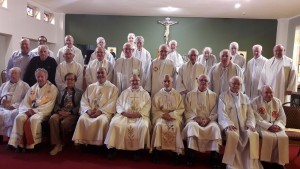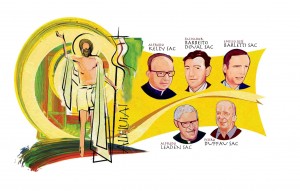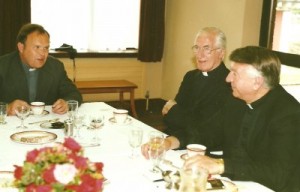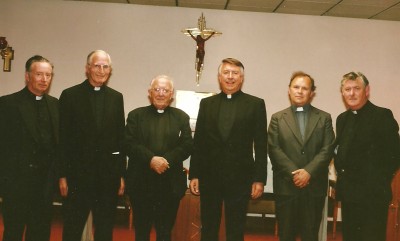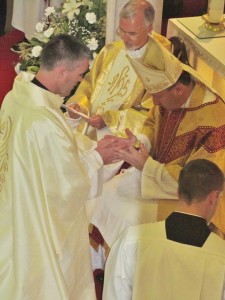DIALOGUE, A PATH THAT LEADS US TO OURSELVES, TO GOD AND TO THE OTHER
Status
 There are several kinds of dialogue, but I will only consider two, which I believe are the basis for the others.
There are several kinds of dialogue, but I will only consider two, which I believe are the basis for the others.
Dialogue: is the most demanding. It is a necessary process for the human being to grow in consistency. It is in this inner dialogue that the world of the conscious and unconscious relationships between the human and the divine manifests itself.
External dialogue: is with all that is added to our existence from outside of ourselves, stirring up desires that are not always necessary for our existence, but both are pertinent to each other; since the interaction between the two favours the solid construction of the identity of the person and the world in which one lives.
For our Pallottine family, such dialogue is, or at least should be, informed by a particular kind of prior experience, because Pallotti’s pedagogy brings us back to the Cenacle where one learns and is enabled for the universal apostolate. The lack of such a profound personal experience of the Cenacle and of its transforming power limits us as persons, with a corresponding limit in our apostolate.
Effective apostolic action requires an understanding and appreciation of oneself and of the world in which our apostolate is carried out, an understanding of the bearer and the receiver of the message, of the person and of the culture.
“Dialogue, a path that leads us to ourselves, to God and the other.”
In the episode of Pentecost, everyone understood what the apostles were saying (Acts 2: 8), all understood the message of salvation despite being people of different languages and cultures. That dialogue generated the communion between people and their cultures.
Today’s culture continually influences us to increasingly become simply consumers of things and ideas. Even the simple advertisement of a chocolate bar has the power to stir up this question in me: is this necessary for me right now? So it is in relation to many other things, which are unnecessary for our happiness. For many, having is more important than being.
The external dialogue produced by the greed of few has caused the lack, the poverty, the absence of a profound inner sense of the human heart. Therefore, there is more interest in knowing the other, what is different, because the richness of the inner self is not known (you will know the truth, and the truth will set you free, Jn 8:32).
Those who have been given a space for dialogue from an early age, will have no difficulty in experiencing and manifesting to the external world the consistency of their inner world.
“Dialogue, a path that leads us to ourselves, to God and the other.”
In all peoples, the family is central in the formation of the person, with the richness and the imperfections of each member. The dialogue between the members includes that between the older and younger generations, thus enabling the transmission of an enduring identity with the proper characteristics of the particular cultural and social group.
The cultures which were evangelized by Christians soon found in the Christian-apostolic tradition an understanding of the saving event through the words of Christ after his death. Faithful to the command of Jesus, the apostles carried the message of salvation to all peoples, through dialogue, accompanied by signs of the effects of the evangelical proclamation in the hearts of the hearers of the Word.. (Go into the whole world and preach the gospel to all nations; Mt 28:19, Mk 16:15).
Modern life has made it much more difficult for people to truly encounter themselves, the other and God. There are many conversations, much knowledge of the outside world, but there is also so much emptiness inside people. We are almost constrained to be experts in the knowledge of things. As far as human beings themselves are concerned, however, we seem to be increasingly unaware of the power of our nature. Encounters with others often serve to reveal the inconsistency of the human being.
Jesus’ dialogue with the disciples on the road to Emmaus is a wonderful model of encounter in dialogue leading to new life. He began by asking them a simple question regarding what they were speaking about, giving them the space to express all that burdened their hearts so deeply in their current situation. Only after listening deeply to the depths of their pain and anguish did he speak to them a life-giving and life-changing word, a word that had the power to cut through their despair and challenge them to look at their situation and their lives with new eyes open to the hope that the Gospel gives. It was only later, after the Lord had opened their eyes fully to who he was, that they recognised the mysterious power of their dialogue with him on the road and the mysterious effect it had been having within them: “Were not our hearts burning within us while he was talking to us on the road, while he was opening the scriptures to us?” (Lk 24:32). It was by learning to listen again with new ears, by seeing again with new eyes, that their hearts were transformed, that they were confirmed again as disciples of the One who had laid down his life for them, and that they were able to became bearers of the reality of his Risen life and presence to others.
“Dialogue, a path that leads us to ourselves, to God and to the other.”
Dialogue with authorities has often proved fruitless and not conducive to communion, with little compatibility of thought. It seems that we have men and women who are infantile in their relationships. The crisis of the human being came about through the crisis of authority; we have many authoritarians, and few true authorities. Authoritarianism involves an absence of affective presence, because it is through affection that we acquire that adult maturity which is able to welcome the other without losing one´s own identity.
In my opinion, in all our Pallottine apostolate we urgently need to learn to perceive, explain and integrate into our praxis the verbs: to feel, to hear and to see, because these verbs are responsible for authentic and consistent dialogue between people. Awareness of feeling is the basis of inner dialogue. What we hear is the basis of listening, of knowing how to open ourselves to other values. What we see forms the basis of our overall vision about the totality that manifests itself in our existence and in the world in which we live.
Dialogue as an instrument for liberation has a principle that we use in our therapeutic community of Mother of Divine Love, in the recovery of chemically-dependent young men who reside in our house; “The diseases that affect the soul enter by the feelings, by what we hear and by what we see. The disease leaves through the mouth, that is, if you do not say what you feel, there is no recovery”.
The ten years of the existence of this charitable apostolate to people who have chemical and/or emotional dependencies have shown us that the more one speaks of what one feels, the more quickly one gains or regains health of soul. The whole therapeutic process is based on love.
Love Heals: detoxification of the body
Love saves: perseverance, those who persevere will be saved from the trafficker, from death, from judgment, from crime, guilt, rejection, etc.
Love liberates: to know one’s inner world, to realise what has led them to the prison of unhealthy affections and drugs.
Love reconciles: with oneself, with God and with others, that is, makes reparation for what one did in a dishonest way.
Living with these brothers, we identify that there are innumerable causes that led them to such suffering, but the main cause was the lack of that dialogue which makes people feel at one with others. Such lack of communication through affective dialogue particularly with those in authority in their lives, with their primary caregivers, has left them fragile, falling into the trap of chemical and affective dependency.
“Dialogue, a path that leads us to ourselves, to God and to the other.”
Thus, the charism of our Holy founder Saint Vincent Pallotti remains a light for the men and women of today, as it was for the people of his time. This inheritance belongs to all Pallottines (Fathers, Brothers, Sisters and Laity).
In Amoris Laetitia, the Holy Father Pope Francis says: those who love are capable of speaking words of comfort, strength, consolation and encouragement. These were the words that Jesus Christ himself said: “Take heart, my son!” (Mt 9:2). “Go in peace” (Lk 7:50). Do not be afraid! (Mt 14:27). (Amoris Laetitia, N° 100).
All of these words should be shared in our families and communities, where the weak becomes strong, the fearful takes courage, the sinner attains holiness.
In short: Dialogue is a door that brings us to the knowledge of the human and divine mystery.
Questions:
- What dialogue do we have with our inner world – what do I not want to see and why?
- Has our apostolate revealed the Pallottine charism to the poor of today?
What kind of dependency do we have that prevents us from being the image and likeness of God’s love to ourselves and to others?
Fr. Orlando SAC.
Brazil
____________________________________________________
Segretariato Generale, Unione dell’Apostolato Cattolico
Piazza San Vincenzo Pallotti 204, 00187 Roma, Italia uac@uniopal.org
Fourth of July Mass to Commemorate the Pallottine Belgrano 5: Homily by Fr. Johnny Sweeney SAC
Status
It feels a little strange to be here with you all this morning, as we celebrate the lives and the witness of the five Pallottines who died on this day, forty-one years ago. They were Argentinians, I am Irish; they experienced a violent death at a time when I was in the peaceful safety of my mothers womb. I am sure that many others could speak more eloquently and knowledgeably than I.
I am continually amazed at how the scriptures speak to us. Throughout the world, this gospel is proclaimed at every mass. St. Paul describes the word of God as “cutting more finely than a double-edged sword”. That means that the word of God reaches out to us and gets to the heart of the matter. For me, today’s Gospel invites us to reflect on our faith in Jesus and our response, and it challenges us to recognize the faith and response of others.
In the Gospel, Jesus and his closest friends are together in a boat. I’m sure that their journey began in a peaceful manner but then, suddenly, in the middle of a dark night, a violent storm erupts and scares them. They fear for their lives and cry out to Jesus, “Save us Lord, we are going down!”. The story of Alfie Kelly, Alfie Leaden, Pedro, Emilio and Salvador mirrors this story. They had committed their lives to Jesus and suddenly, in the middle of a dark, winters night, violence erupts. I’m sure they must have been scared. They feared for their lives and probably knew that the end of their earthly lives was near. I believe that their last prayer would have been an echo of the prayer of the apostles, “Save us Lord, we are going down!”.
In our gospel, Jesus brings peace and calm and the apostles are amazed. It is our hope and desire that Jesus has brought Pedro, Alfie Kelly, Alfie Leaden, Emilio and Salvador to a place of peace and rest, and that these five men are experiencing the awe and amazement of heaven. Jesus saved the apostles, and it is our belief that Jesus saves all those who commit their lives to him and who bear witness to his love and life.
The apostles called on Jesus in their need because they had faith in him. The five men we remember today shared their lives and offered their lives to God as his servants. They lived a time of great division and pain, and met the challenge of this time with the Gospel of Jesus. We remember them primarily for the witness they gave to Christ in their lives, not for the violent manner of their death. They lived for Christ, this is what is important. The violent manner of their death was and is a disgrace, but we are called to focus on the grace present in their lives.
I am a foreigner living here in Argentina. I do not pretend to understand the history of this country or of that time, but I do come from a country that has experienced violence and division. In Ireland we experienced a civil war, when Irish men fought Irish men. In the Gaelic language it was known as the “cogadh Na gcarad”, which translates as, the war between friends. This description of that conflict also expresses a desire for unity and healing, to reunite once more as friends. This nation also experienced violent division. I pray today for healing and peace for  this nation, for peace in my own land, and for peace in the world. Emilio, Salvador, Pedro, Alfie Dufrau and Alfie Kelly committed themselves to the Gospel of Jesus. This Gospel desires healing and reconciliation, peace and community, forgiveness and love. We pray for the grace today to forgive those responsible for this terrible act of violence, we ask that we would live out the Gospel message in our hearts, our communities and our homes, we ask that we would bring light and love to our world. We ask for the peace which only Jesus can bring. + Amen.
this nation, for peace in my own land, and for peace in the world. Emilio, Salvador, Pedro, Alfie Dufrau and Alfie Kelly committed themselves to the Gospel of Jesus. This Gospel desires healing and reconciliation, peace and community, forgiveness and love. We pray for the grace today to forgive those responsible for this terrible act of violence, we ask that we would live out the Gospel message in our hearts, our communities and our homes, we ask that we would bring light and love to our world. We ask for the peace which only Jesus can bring. + Amen.
Funeral Homily for Fr. Bill Hanly SAC by Provincial Fr. Derry Murphy SAC
Status
Homily at the concelebrated Requiem Mass for the late Fr. William (Bill) Hanly, SAC.
Pallottine College, Thurles, on Monday 3rd July 2017 at 12.00.
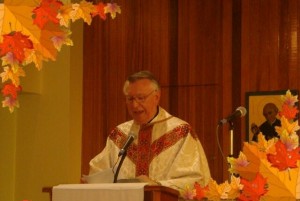 My dear brothers and sisters, today we are gathered to celebrate Fr. Bill’s life, his 85 years on earth, his 60 years of priesthood and his 65 years of Pallottine consecrated life. We celebrate his person, who and what he was to us, to the People of God and to all those he ministered to over the course of his life.
My dear brothers and sisters, today we are gathered to celebrate Fr. Bill’s life, his 85 years on earth, his 60 years of priesthood and his 65 years of Pallottine consecrated life. We celebrate his person, who and what he was to us, to the People of God and to all those he ministered to over the course of his life.
Today is the feast day of St. Thomas the Apostle, otherwise known as ‘doubting Thomas’, or as the apostle who needed to see Jesus after the Resurrection, to see him, to touch him and to place his fingers in the wounds; the apostle who needed a concrete experience of the risen and living Jesus Christ. Thomas is less well known as a great traveller, he is credited with bringing the Gospel of Jesus Christ to the Indian sub-continent in the 1st century of the life of the Church. According to an ancient Syriac document the apostles gathered after the Ascension of Jesus Christ and they cast lots to determine who would go in each direction. The document attests that Thomas went to India and spent the remainder of his life there.
Fr. Bill’s life as a Pallottine mirrored that of Thomas the Apostle in his faith experience and in that of a great traveller. Fr. Bill’s life took him from his native Askeaton where he was born on 20th November 1931 and where he received his primary education at Askeaton National School, before going to the Redemptorist College in Limerick for his secondary education.
Bill came to Thurles as a young man; he came to the novitiate in Cabra on 16th September 1949, before his eighteenth birthday. His travels to further afield started the following year, 1950, when he was sent to study Philosophy at the Pontifical Gregorian University in Rome and on completion of the three year study course he remained on for a further three years of Theological studies. While a student in Rome he made life-long friendships with other Pallottines from South America, Germany and Italy. One of his friends from those years was Fr. Joao Battista Quaini, a Brazilian Pallottine who died just six weeks before Fr. Bill. In conversation last night Fr. George Ranahan reminded us of other illustrious priests such as Cardinal Cormac Murphy O’Connor who were also fellow students with Bill at that time.
Fr. Bill had a keen mind and an aptitude for studies and so he was sent to the Catholic University of Washington after ordination to the priesthood on 30th September 1956, and there he received a Licentiate in Theology in 1958. Once again he travelled, this time further north to the University of Detroit in Michigan for an MA in history and on completion of this degree he was appointed Catholic Chaplain to Texas Tech University in Lubbock and assistant priest at St. Elizabeth’s Parish.
A change of direction took place in 1964 when Fr. Bill was elected Provincial Consultor and secretary to the Provincial and he moved to London. In 1965 he became Rector of the College here in Thurles and it was from here that he was first elected Provincial in 1969, which meant that he moved back to London. Fr. Bill’s life as a priest and in particular as Provincial brought him to many countries around the world and he was an enthusiastic traveller. Wherever he went he brought the Gospel of Jesus Christ to each place; he embodied a strong faith and a very evident joy in living. It is fitting that we are celebrating his funeral Mass today, the feast of St. Thomas the Apostle, a man of a similar strong faith.
Now I will turn to the Scripture readings for today’s Mass. The first reading, which was read for us by Fr. Bill’s niece Helen, is from the Book of Job; Job was a man of faith who lived through many difficulties and vicissitudes and yet could affirm his faith and his conviction that “I know that my Redeemer lives”, with a the stress on “I know” that God exists, Fr. Bill also affirmed his conviction and his ‘knowing’ that God lives, he may have had difficulty in articulating it, like we all do, but he had the conviction. Job goes on to state his belief that after death “in my flesh I shall see God, yes, with my eyes I will see him”; this too was the hope and the belief of Bill, to look on God and to see him after death.
The second reading today, read by Adrian, Bill’s nephew, is the reading from the Feast Day Mass of St. Thomas the Apostle and is from St. Paul’s Letter to the Ephesians. Here Paul expresses his vision and his understanding of a central truth of the Christian life: “you are not aliens, not alone, you are part of God’s household, part of God’s family”, a lovely vision of where we belong. Paul then writes of building up the People of God, and emphasizes that we are part of the building; each one has a place and a role in being built into a house which is founded on Jesus Christ the foundation, where God lives, in the Spirit. Fr. Bill shared this vision of forming God’s household – family; throughout his life as a priest he gave himself to building the Church, the place where the Spirit lives and where each person can have a place and a role. We have received many messages since Bill died, and some messages and tributes to Bill the priest, pastor and spiritual guide were sent to our Province website or posted on Facebook and they all have in common the affirmation that Bill dedicated his life to building up God’s people on earth. Fr. Bill was a very active priest, he was our Provincial for 15 years, from 1969 to 1975, when he was succeeded by Fr. Pat Dwyer, and then again from 1987 to 1996, when he in turn was succeeded by Fr. John Fitzpatrick; and as Provincial he contributed much to our life. However, as a pastor, a beloved pastor, as retreat director, as spiritual guide, he left a lasting legacy in the lives of those he ministered to, be it in Texas, in Detroit, in Nevada, Clerkenwell, Greenford or Ireland.
Fr. Bill, the man and the priest, knew pain and suffering, he faced his own limitations and his struggles. In later years his declining health and strength were particularly tough on a man who enjoyed very robust good health all through his life. The Cross, or indeed the double cross, of Parkinson’s disease and dementia were hard and cruel. He became increasingly reduced and it was sad to see that and to fathom the ‘whys’. However, in the midst of it all he was unfailingly polite, gracious, kind and educated, a gentleman in the true sense.
The Gospel reading at today’s Mass, Jesus teaching his disciples to pray with the “Our Father”, is a text I chose for a reason. Fr. Bill was a man of prayer, and we all knew his favourite prayers, Thomas Merton’s “My Lord God, I have no idea where I am going….” (which Fr. Gerry Fleming will read after Communion), John Henry Newman’s “May he support us all the day long…” (which Fr. Mike O’Dwyer will read) and St. Francis of Assisi’s “Lord, make me an instrument of thy peace …”. My last visit to Fr. Bill took place ten days ago, he had no words that day, no greeting, no conversation, and I sat with him. Finally, I said to him “Bill, I will pray with you’ and blessed myself and started the Our Father, and he joined in and prayed along with me, and when I said ‘Amen’ he continued with ‘For thine is the Kingdom and the power and the glory for ever and ever, Amen’. The prayer he had learnt as a child, from his parents, or his older siblings maybe, that prayer was there at the end. I was struck by this, that when all his faculties had failed he could still pray. A testament to a life of prayer; a legacy and a message to us too on how central prayer is to the life of the Christian and how this privileged contact with God sustains us to the end.
In summary, Fr. Bill’s life was characterized by three things; by faith, like the faith of Job, of St. Thomas the Apostle; Fr. Bill knew himself to be an apostle and he went wherever life took him with the Gospel of Jesus Christ; and he was a man of prayer, the priest.
Today we celebrate Fr. Bill’s life and we give thanks.
Ar dheis De go raibh a anam uasal.
Fr. Derry Murphy, SAC.
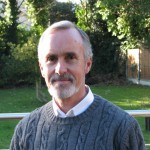
HOMILY OF NEWLY ORDAINED FR. CHARLES LAFFERTY SAC: First Mass of Thanksgiving
Status
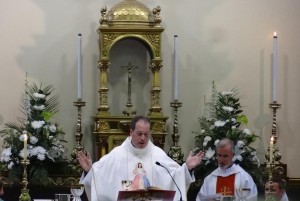 I just went for the readings of today, not because of laziness on my part, but I truly believe that whenever we come to celebrate these sacred mysteries God’s Word will always have something to say to all of us. Some times when we read or listen to the scriptures we can paint an idealistic picture – we might hear of one of the great miracles of Jesus or the exemplary retelling of the prophets or apostles. We are encouraged to do this and it is tricky if not difficult to balance the big picture with the small details. So much so that when we hear scripture we can wish that we were there in those times – because let’s face it: today it is tough to be a Christian, to be Catholic, to celebrate our faith openly, courageously and enthusiastically – if only we could be there with Jesus then things would be so much easier. It would be great for me because my age would be more in keeping with the apostles so I might not be counted so much as a late vocation!! But then again being in those times would actually have its own worries and problems – there were people in those times who didn’t know the significance of being in the presence of God. Abraham was 99 years when God made his covenant with him and Sarah – he struggled to comprehend how God would act. And then with the leper in the Gospel it is nearly like a pantomime as he says – if you want to – it reminds me of that Dickens story of the young boy going to ask for more food – more food!! As if the leper had a twisted or distorted view of Jesus – a view that perhaps Jesus wasn’t in the mood to deal with this person – something akin to when some priests or some people aren’t quite in the mood to help out a particular person on any given day. There is also the humility that springs forth from the mouth of the leper but the response of Jesus, as with God in the encounter with Abraham, is one of mercy. And it is this mercy that we celebrate tonight that the world is in such a need for.
I just went for the readings of today, not because of laziness on my part, but I truly believe that whenever we come to celebrate these sacred mysteries God’s Word will always have something to say to all of us. Some times when we read or listen to the scriptures we can paint an idealistic picture – we might hear of one of the great miracles of Jesus or the exemplary retelling of the prophets or apostles. We are encouraged to do this and it is tricky if not difficult to balance the big picture with the small details. So much so that when we hear scripture we can wish that we were there in those times – because let’s face it: today it is tough to be a Christian, to be Catholic, to celebrate our faith openly, courageously and enthusiastically – if only we could be there with Jesus then things would be so much easier. It would be great for me because my age would be more in keeping with the apostles so I might not be counted so much as a late vocation!! But then again being in those times would actually have its own worries and problems – there were people in those times who didn’t know the significance of being in the presence of God. Abraham was 99 years when God made his covenant with him and Sarah – he struggled to comprehend how God would act. And then with the leper in the Gospel it is nearly like a pantomime as he says – if you want to – it reminds me of that Dickens story of the young boy going to ask for more food – more food!! As if the leper had a twisted or distorted view of Jesus – a view that perhaps Jesus wasn’t in the mood to deal with this person – something akin to when some priests or some people aren’t quite in the mood to help out a particular person on any given day. There is also the humility that springs forth from the mouth of the leper but the response of Jesus, as with God in the encounter with Abraham, is one of mercy. And it is this mercy that we celebrate tonight that the world is in such a need for.
For me then, it is the way in which we approach God, we may not always have the right language or the right view of things but we struggle on with hope.
The point of Jesus coming down from the mountain could be seen as its all down hill from there on – plain sailing, he had just delivered his great sermon on the mount, turning hearts on fire, large crowds following him – happy days!! Just like for me yesterday, such a great and blessed day – crowded for photographs which I really love, greeting so many family members and friends – and then not many of you will know – I was faced with the reality of priesthood today – complete abandonment. There were a few people hanging around, some cleaning up, some chatting, and there was I, ready to make my triumphal entrance into the City hotel – little did I realise that my mum, my dad, my brothers and sisters, all of them had left me there in the Church car park – thank God for a few lost sisters that rushed to my aid!!
Ok so I jest, but we really are at the mercy of God – even in the good times. I was absolutely shaking before the start of the ordination ceremony, I could think of another few words, but I’ll stick with shaking, as I came to the Church yesterday – but with prayer, a few kinds actions from my excellent MC and a few fine words from Fr Neil, I was able to make my way up this aisle. It was only as I listened to Bishop McKeown’s homily that I was able to relax, to abandon myself to God’s mercy.
It was those words of being impelled by the love of Christ and that quote from St Vincent: seek God and you will find him, seek him in all things and you will find him in all things; seek him always and you will always find him. These words pushed home the need to hand things over to God because he has worked such great marvels in my life, and yes there may be times of difficulty ahead but he will still be there and he will do great things because he wants to – that is what the mercy of God is – to intervene in humanity so that his Word, his Son Jesus Christ, can bring about our redemption.
I was also worried about this homily as I got it confused with a similar account in the Gospel of Mark – only in that version it finishes with the leper, well a possessed man I think, by going off and doing the exact opposite to what Jesus asked him to do – the worry being that my mum or my dad might hear that disobedience and try to persuade me not to go off to Argentina – as if I would even try and be disobedient to my provincial. In all seriousness Jesus offers us the way to eternal life and I couldn’t be more happier or thrilled to be going to the other side of the world because I know I have so many good wishes and prayers backing me up. Let us continue to pray for each other, that with Mary and through the actions of the Holy Spirit, we may keep the presence of Jesus truly alive in our Church and in our world.
ORDINATION OF FR. CHARLES LAFFERTY SAC: Homily of Bishop Donal McKeown
Status
Ordination of Rev Charles Lafferty
St Mary’s Church, Ardmore, Derry
June 29th 2017
Bishop Donal McKeown
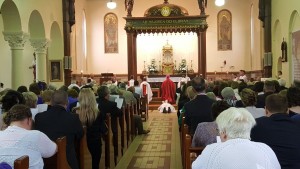 In St Peter’s Square in Rome in front of the Basilica, there are two huge statues of Saints Peter and Paul. St Peter bears the keys and St Paul the book of the scriptures. And it is on these two pillars that the early church was formed – on the proclamation of the word which cuts like a two-edged sword and on the visible unity within the Body of Christ. Thus this feast day is a wonderful date for the ordination of a young man who wishes to give his whole heart and life to being an apostle of Jesus – for that ministry will be based on the stumbling faithfulness of Peter and the passionate preaching of Paul.
In St Peter’s Square in Rome in front of the Basilica, there are two huge statues of Saints Peter and Paul. St Peter bears the keys and St Paul the book of the scriptures. And it is on these two pillars that the early church was formed – on the proclamation of the word which cuts like a two-edged sword and on the visible unity within the Body of Christ. Thus this feast day is a wonderful date for the ordination of a young man who wishes to give his whole heart and life to being an apostle of Jesus – for that ministry will be based on the stumbling faithfulness of Peter and the passionate preaching of Paul.
What can I say to you, Charles, as you come before the Lord to be ordained for service in the Pallottine congregation?
Firstly, the Pallottine tradition has a wonderful scriptural motto – Caritas Christi urget nos (2 Cor 5:14), the love of Christ impels us. Charles, you are here today because you have sensed that unsettling and exciting call to go out from your comfort zone, just as the early Church was driven into the hurting peripheries of their city and from Jerusalem to the peripheries of the known world.
And the Gospel mission that drives you on is based on the example of the God who so loved the world that he sent his only Son (Jn 3:16) to be humble even to accepting death on a cross (Phil 2:8). You want to speak Jesus who is the Truth into the heart of the world. It is ironic that, after decades when we were told that there was a clash between irrational faith and reason, we are now faced with the reality that our culture is talking about post-truth and it is believers who are insisting the possibility of truth! We have such a focus on the individual creating their own reality and truth that anyone who speaks of truth and reason is caricatured as being dogmatic, illiberal or bigoted.
And our culture is not only reluctant to accept the possibility of agreed truth. Where there is no truth, there is no meaning to life, other than a meaning that I create. A modern French philosopher wrote some 30 years ago that “We live in a world where there is more and more information and less and less meaning.” (Jean Baudrillard quoted in The Tablet, 20 May 2017 p.4). In an age of post-truth, where everything is only interpretation, that doesn’t lead to freedom but to the domination by the strong. You feel called and driven by the love of Christ to proclaim the Truth who sets us free from the domination of the strong. Jesus invites us to be freed from what happens when we seek the knowledge of good and evil in places other than where the Creator tells us. Good Christian teaching offers us a real theology of liberation. Dedicate your life to letting the love of Christ for the world and for its little people drive all that you do, whether you are working here or halfway round the world.
Secondly, the Pallottine family has a very revealing name – Societas Apostolatus Catholici, the Society of the Catholic Apostolate. Your wise founder wanted to focus on the call to all baptised to spread the Good News. That message has been re-echoed in the last 50 years – but many of our parishes and dioceses are still functioning in an unhelpful clericalist mode.
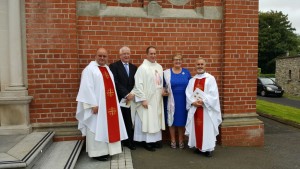 Clericalism occurs when the clergy think they have to do everything and then find themselves exhausted because they can’t do it. A clergy-dominated church or parish will fail to develop the apostolate of the laity. And that apostolate is not a threat to the ordained minister. The priest is ordained to do three things – to preach the Gospel, to celebrate the sacraments and to lead. In Ireland we used to have a great missionary tradition that inspired thousands of our best young men and women to dedicate their lives to mission and go to the ends of the earth. That energy is no longer there to the same extent. The task for the modern Irish church is to be re-energised by the mission of every baptised person to evangelise and bless our hurting country with the one who is the Way, the Truth and the Life.
Clericalism occurs when the clergy think they have to do everything and then find themselves exhausted because they can’t do it. A clergy-dominated church or parish will fail to develop the apostolate of the laity. And that apostolate is not a threat to the ordained minister. The priest is ordained to do three things – to preach the Gospel, to celebrate the sacraments and to lead. In Ireland we used to have a great missionary tradition that inspired thousands of our best young men and women to dedicate their lives to mission and go to the ends of the earth. That energy is no longer there to the same extent. The task for the modern Irish church is to be re-energised by the mission of every baptised person to evangelise and bless our hurting country with the one who is the Way, the Truth and the Life.
But the temptation to clericalism has often reduced the call to a lay apostolate to that of lay ministry. That can end up with being just a clericalisation of some laity who help the priest to do his things – distributing Holy Communion, holding weekday services or even burying the dead. But it is not a development of the vision of Chrstifideles Laici. The real apostolate that Vincenzo Pallotti prophetically made space for the mission of the ordained to preach, sanctify and lead and the mission of the each member of the non-ordained to have an apostolate within the missionary people. The service of the ordained minister is to teach, sanctify and lead in Christ’s name so that the evangelising apostolate of the church can be carried out by every baptised member. A church of clericalised clergy and laity will not attract and inspire young people because it is not faithful to the Gospel idealism of Jesus. The vision of the Pallottines is one that we need in modern Ireland. Be proud of your heritage and share it with the rest of the local church where we have not developed a vibrant lay apostolate for all. There is absolutely no contradiction between the ministry of the clergy and the apostolate of the laity. Be a sign of the wisdom of Pallotti to our modern church.
Thirdly, you are taking on a difficult role. But don’t feel smug about how much you might be sacrificing. Life is difficult for so many people out there, whether they are young or old, single or married, ordained, consecrated or separated. The myth of salvation by maximum pleasure and maximum freedom for all is so deceptive a lie. Jesus says that salvation for the world comes through heroism, generosity, self-sacrifice and love. And those who propose that wise truth will be criticised. So your celibate and modest self-style is not a source of personal pride but a counter-cultural prophetic act about what really liberates us. Jesus quoted Jonah as a sign to the people of his day (Matthew 12:40). You, by your life-style of simplicity and solidarity with the weak are meant to be a sign, an icon of Christ to this generation. Your ministry may ask you to suffer for people. But the really hard bit is to suffer with people – that is what compassion means. Jesus was not afraid of being humble, even to death on the Cross (Phil 2:8). The ordained minister in a special way, in being configured to Christ, is not to be afraid to go to the human peripheries and sit there in apparent failure with those who experience terrible loss and failure. Your own vulnerability is not a barrier to you being in solidarity with people. It is a grace to enable compassion and mercy to grow in your heart through the grace of Jesus.
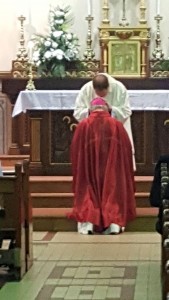 Today, on your ordination day, I invite you to look to the figures of Peter and Paul. The former was sustained by the prayer of the church in his time of trial and by the mission of Christ in his daunting ministry of leadership. And the latter did not convert the world – but ran the race, fought the good fight to the finish. That was all he was asked to do. Do not be afraid of proclaiming the love of Christ which drives you on. Be dedicated to developing the apostolate of the laity in missionary church. And never be ashamed of witnessing to the Cross of Christ – for divine weakness is stronger than human strength. Look forward and not back, for the Promised Land does not lie behind us. Help the people of this generation to believe that they too can
Today, on your ordination day, I invite you to look to the figures of Peter and Paul. The former was sustained by the prayer of the church in his time of trial and by the mission of Christ in his daunting ministry of leadership. And the latter did not convert the world – but ran the race, fought the good fight to the finish. That was all he was asked to do. Do not be afraid of proclaiming the love of Christ which drives you on. Be dedicated to developing the apostolate of the laity in missionary church. And never be ashamed of witnessing to the Cross of Christ – for divine weakness is stronger than human strength. Look forward and not back, for the Promised Land does not lie behind us. Help the people of this generation to believe that they too can
Seek God and find him;
seek him in all things and find him in all things;
seek him always and always find him. (St Vincenzo Pallotti)
Do that and the Lord will help you to do great things, because of your dedication and despite your frailties.
Click HERE to see more photos
Click HERE to read Fr. Charles’ Homily at his First Mass
170629 Charles Lafferty ordination DMcKPage 3
Fr. Bill Hanly SAC R.I.P.
Status
 Fr. William (Bill) Hanly, SAC, died peacefully following a long and progressive illness on the evening of June 27th at 19.10 in the excellent and tender care of all the staff at St. Theresa’s Nursing Home in Thurles.
Fr. William (Bill) Hanly, SAC, died peacefully following a long and progressive illness on the evening of June 27th at 19.10 in the excellent and tender care of all the staff at St. Theresa’s Nursing Home in Thurles.
Fr. Bill had been in the care of the staff at St. Theresa’s since September 2012. As a community we are very grateful to each member of staff and management at St. Theresa’s for the attention and excellent care they gave to Fr. Bill, and to the other Pallottines who were residents there.
One of Fr. Bill’s favourite prayers which he recited frequently after Holy Communion is very appropriate for him at this time:
“May He support us all the day long, till the shades lengthen and the evening comes, and the busy world is hushed, and the fever of life is over, and our work is done. Then in His mercy may He give us a safe lodging, and a holy rest and peace at the last.” Card. John H. Newman.
Fr. Bill’s funeral arrangement are:
Viewing in the Pallottine College in Thurles on Sunday 2nd July from 16 – 19; followed by removal to the Chapel.
Concelebrated Funeral Mass on Monday 3rd in the College at 12 noon, followed by burial in the Pallottine Community Cemetery at St. Marys, Cabra.
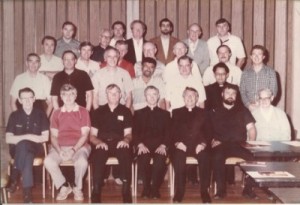 Fr. Bill is mourned by his Pallottine Community, his sister, Mary Frost, his brother, James Hanly, his sisters-in-law, nieces and nephews, grandnieces and grandnephews, and a wide circle of friends in many parts of the world.
Fr. Bill is mourned by his Pallottine Community, his sister, Mary Frost, his brother, James Hanly, his sisters-in-law, nieces and nephews, grandnieces and grandnephews, and a wide circle of friends in many parts of the world.
May his good soul rest in eternal peace.
Derry Murphy, SAC.
Provincial
The Thomas Morton Prayer
MY LORD GOD, I have no idea where I am going. I do not see the road ahead of me. I cannot know for certain where it will end. Nor do I really know myself, and the fact that I think I am following your will does not mean that I am actually doing so. But I believe that the desire to please you does in fact please you. And I hope I have that desire in all that I am doing. I hope that I will never do anything apart from that desire. And I know that if I do this you will lead me by the right road, though I may know nothing about it. Therefore I will trust you always though I may seem to be lost and in the shadow of death. I will not fear, for you are ever with me, and you will never leave me to face my perils alone.
– Thomas Merton, “Thoughts in Solitude”
© Abbey of Gethsemani
The Touch of the Master’s Hand
‘Twas battered and scarred,
And the auctioneer thought it
hardly worth his while
To waste his time on the old violin,
but he held it up with a smile.
“What am I bid, good people”, he cried,
“Who starts the bidding for me?”
“One dollar, one dollar, Do I hear two?”
“Two dollars, who makes it three?”
“Three dollars once, three dollars twice, going for three,”
But, No,
From the room far back a gray bearded man
Came forward and picked up the bow,
Then wiping the dust from the old violin
And tightening up the strings,
He played a melody, pure and sweet
As sweet as the angel sings.
The music ceased and the auctioneer
With a voice that was quiet and low,
Said “What now am I bid for this old violin?”
As he held it aloft with its’ bow.
“One thousand, one thousand, Do I hear two?”
“Two thousand, Who makes it three?”
“Three thousand once, three thousand twice,
Going and gone”, said he.
The audience cheered,
But some of them cried,
“We just don’t understand.”
“What changed its’ worth?”
Swift came the reply.
“The Touch of the Masters Hand.”
A mess of pottage, a glass of wine,
A game and he travels on.
He is going once, he is going twice,
He is going and almost gone.
But the Master comes,
And the foolish crowd never can quite understand,
The worth of a soul and the change that is wrought
By the Touch of the Masters’ Hand.
Myra Brooks Welch
Homily At Fr. Bill’s Funeral Mass by Provincial Fr. Derry Murphy SAC
HOMILY OF NEWLY ORDAINED FR. LIAM O’DONOVAN SAC, First Mass of Thanksgiving, Feast of Corpus Christi
Status
 Fr. Liam O’Donovan SAC with his uncle Fr. Pat Dwyer SAC and Bishop Alphonsus Cullinan
Fr. Liam O’Donovan SAC with his uncle Fr. Pat Dwyer SAC and Bishop Alphonsus Cullinan
I have to admit that there was a time when I struggled with belief in the mystery we celebrate today: that the bread and wine at Mass are transformed into the body and blood of Jesus, that Jesus is really present in the Eucharist, body, blood, soul and divinity. Like the Jews in the gospel today many find this difficult to accept, even though it’s one of our central mysteries of our faith. As I persevered in my struggle to grasp this mystery, I realised that my problem wasn’t an intellectual one, but that my temptation to unbelief was based in fear. I mean if I really accepted that this is Jesus it changes everything; it changes what I think about God; it changes what it think about myself; it changes what I am called to become. If this is really Jesus giving himself to me, in this complete way, then I will have to change—or rather he is going to change everything if I allow him.
This lead me to a point of decision: I could no longer live with the contradiction—on the one hand choosing a sinful, selfish way of living, and on the other hand, believing and receiving this most beautiful and good and loving gift of Jesus in the Eucharist. I began to appreciate the wisdom of the Church’s teaching that requires us to abstain from the Eucharist if we are in a state of serious sin, if we have not gone to confession for a long time—because the contradiction tears you apart.
Why so many refuse to believe and stop coming to Mass, is not because they find the reality of the Eucharist unreasonable or impossible to comprehend, but because they are afraid. They are afraid that Jesus is going to take away their freedom, to curtail their life style, to suck all the enjoyment out of life. The opposite is the reality, however—often all the ways we try to satisfy our hunger for life leave us in a state of spiritual starvation. Only Jesus can satisfy our deep hunger. Trust in Jesus, trust in his word: “Whoever eats me, [eats my flesh and drinks my blood] will draw life from me” (Jn 6:57).
There is a story told of a young Jewish boy who refused to go to school. His parents tried everything, from punishing him, giving out to him, to bribing him, but none of this worked. Eventually they went to their Rabbi for advice, and he told them to bring the boy to him. When they boy came to him the Rabbi did not speak a word—he simply took the boy in his arms and embraced him. After that the boy returned to school, there was no more problem. This is what the Eucharist is for us—its God’s physical embrace that transforms everything. When everything else has failed, when we’ve tried every other way to find the meaning of life, and when we’ve tried to fulfil that hunger inside us with everything else, we discover that it’s only in the loving embrace of Jesus in the Eucharist that we are given life. It here we discover the thing that we don’t even know we are searching for.
Consider that at each celebration of the Eucharist the sacrifice of Christ on the Cross is made present. In a very real way Jesus hangs before us with his arms outstretched on the Cross, as if ready to embrace us. In this supreme act of love he sacrifices himself for us, he surrenders himself to us in the form of bread and wine—“This is my body given up for you.” When we contemplate the depth of his love in this way how can we reject this, or become indifferent to it? Not to come here to worship at the Eucharist, not to open ourselves up to this GIFT is an injustice to not only to God, but to ourselves also. Sometimes we can think of coming to Mass as a burdensome obligation imposed by the Church or God. But the Eucharist is for you, the Eucharist is the source of your true life—“This is my body given up for you.” With these words of the Mass Jesus addresses us as a community and each one of us personally. Jesus wants to gives himself to you in this most intimate and complete way, to enter into the depth of your being. He wants to draw you into a relationship with himself that will transform everything for you, until you realise I’m home, I’ve found the one that my heart hungered for all this time.
Do not be afraid any longer; Jesus is waiting for you here in the Eucharist, waiting to embrace you and transform your life in ways that you can’t imagine.
CLICK HERE FOR HOMILY OF BISHOP ALPHONSUS CULLINAN
PLUS PHOTOS
Homily for the Ordination of Liam O’Donovan SAC by Bishop Alphonsus Cullinan
Status
The Giving of Self
I was struck by your choice of Gospel for this your ordination. It is a sobering text. Peter getting on in years is told by Jesus that he will from now on not go where he wishes but will be shown the way, little by little, as to where he is to go and how he is to live.
How utterly counter-cultural this is. The modern thinking, the thinking of today and for perhaps three centuries, is that we should follow our own way, reach our own star, to achieve fulfilment and happiness. Instead of following our own will, Jesus says “follow me”. For us moderns so often personal happiness is the goal.
C.S. Lewis novelist (and we can say prophet) writing on happiness says;
“What Satan put into the heads of our remote ancestors was the idea that they could ‘be like gods’—could set up on their own as if they had created themselves—be their own masters—invent some sort of happiness for themselves outside God, apart from God. And out of that hopeless attempt has come nearly all that we call human history—money, poverty, ambition, war, prostitution, classes, empires, slavery—the long terrible story of man trying to find something other than God which will make him happy.”
We see this today – people searching for life without because they don’t have life within.
Pope Francis has given us a wonderful letter about the care of our common home – In Laudato Si. Towards the end of it he quotes from Pope Benedict – we read : “the external deserts in the world are growing, because the inward deserts are vast.” The human person without God ends up chasing around in a kind of desperate search for happiness, needing to be continually amused and distracted because in the heart there is neither peace nor purity.
I think this is so true. So many of our brothers and sisters search desperately for meaning and a reason to live. So many are crying out for something authentic, for truth, for something good and beautiful, but who have been taught to think of this world only, and end up lost in the distractions of pleasure or power or control. They have lost God in their lives, and the habit of prayer and the sacraments, or have grown cold and indifferent. Left to our own devices the human will runs wild, like a river which has burst its banks and spreads out over the flat land to become a swamp, a stagnant lake.
But when things seem to be falling apart maybe they are falling into place through God.
Jesus knows our weakness, and comes to our help. And he has chosen you Liam in this special way to help him heal human hearts.
In Vatican II’s pastoral constitution on the Church in the Modern World we read:
The truth is that only in the mystery of the incarnate Word does the mystery of man take on light…… Jesus Christ, fully reveals man to man himself. G.S. 22
And later on it states:
The human person, who is the only creature on earth which God willed for itself, cannot fully find himself except through a sincere gift of self.
Summed up by the Lord himself in the words recorded in the Gospels
He who loses his life will save it.
Jesus himself gives the supreme example:
“the Good Shepherd lays down his life for the sheep” ( Jn. 10:11).
“ So, we are led straight to the centre, to the summit of the revelation of God as the Shepherd of his people; this centre and summit is Jesus, Jesus himself who dies on the cross and rises from the tomb on the third day, rises with all his humanity and thereby involves us, every man and woman, in his passage from death to life. This event — the Pasch of Christ — in which he completely and definitively fulfills the pastoral work of God, is a sacrificial event. The Good Shepherd and the High Priest therefore coincide in the person of Jesus who laid down his life for us.” (Pope Benedict- homily for priestly ordination)
Similar ideas of G S are in fact found in the writings of Vincenzo Pallotti, the founder of your order.
He believed that if we model ourselves on Jesus, we would always aim to become who we truly are. How do we model ourselves on him? He writes:
“To follow our Lord Jesus Christ we need above all his spirit. This means all inner actions of our soul must be similar to those of our Lord Jesus Christ, so that we may truly follow Him also in his exterior actions.” “Jesus sanctifies, improves and enriches, with His infinite merits, all the words, thoughts and deeds of our life, even those which are mediocre, as long as they are done for God and as long as we are in a state of grace”.
- Pallotti’s life was a constant effort to live in the mystery of the presence of the God who is infinite. God invites us all into his presence.
The invitation from Jesus himself has been made to you Liam. Seven years ago you decided to answer that call to see if priesthood was his will for you and you went to the seminary and now today you say that total yes, definitively, to his invitation and you will be ordained his priest.
This is not a trophy but a service, – a service to the people of God.
Pope Benedict said some years ago in Rome at an ordination ceremony:
“The sacrament of orders which you are going to receive today will make you a sharer in the work of Christ.” This is a simple and beautiful way to explain our work – to be sharers in the work of Christ:
to scatter the seed of God’s Word , to preach in his name, to baptize,
To dispense his mercy of God especially in the sacrament of confession,
and to nourish his people with the Eucharist.
And tomorrow you will celebrate your first full Mass on the Feast of Corpus Christi – what a wonderful way to begin your celebrating of the Holy Sacrifice!
Liam, God is counting on you and me and all of us to help him bring salvation to the world. Without God we are lost. We read in the Gospels –
“ and as he got out of the boat he saw a great throng, and he had compassion on them for they were like sheep without a shepherd and he began to teach them at some length.”
Liam you are embarking on a wonderful journey of sharing in the priesthood of the eternal priest – Jesus Christ.
Your task, with your brother priests in the Society of Catholic Apostolate – Pallottines and in union with good people of like mind, will be to gather his people back to him, to gather into his flock including those who stray from the sheepfold, and run away. Did he not say to us that he has come to seek out and save the lost sheep. But we are all the lost sheep and we all stray. I stray and I need confession regularly and so I too experience the healing of God’s grace in confession. Otherwise sin builds up inside and the human heart can become so used to sin that it cannot see for the darkness – like a window pane that has become so dirty it cannot let the light in.
God is asking you Liam to speak with courage, with patience and compassion to the world, to society today – to tell your brothers and sister that this world is not all there is, that this life and all is has to offer is not all there is, that we are created by God, that we have a destiny beyond this world, which begins here but which stretches into eternity, that we are here on earth to know love and serve God and to live in a such a way as to live with him forever in heaven.
As priest you will be a sign for all this. A sign that points to God, to the need for God’s grace and salvation. And sometimes not a welcome sign. In that you will be like your father in faith – Vincenzo Pallotti who was no stranger to insult, persecution and difficulties. And as you offer the Holy sacrifice of the Mass you will offer own difficulties and sacrifices and troubles with Jesus himself in the Mass.
That will be your task Liam – to be Christ for others, to be with his brothers and sisters who are also your brothers and sisters.
You will make mistakes, as I do and all of us, for you, like us all, are weak. But His grace lifts up our nature.
We rely not on our own strength but on the strength of God. And God is very strong – with a strength beyond all we can imagine.
I pray that I and all your brother priests will give you good example and that together and with the aid of many people around you, you will do great things for God.
None of this can be done without a commitment to daily prayer.
I know in my own life that any day I do not pray that day’s work is empty. Any day I really pray and rely on the Lord consciously and perseveringly, that day’s work is good and fruitful.
But again this is the work of God not the work of men.
May Christ’s friendship be your strength.
From today you will be his priest. May you learn more and more to give yourself as Christ did. In that way you will grow closer to Christ and to your fellow brothers and sisters.
Vincenzo Pallotti had a real and living devotion to Mary the mother of Jesus and one of his favourite titles for our Blessed Lady was – ‘Mother of Divine Love’. May the Mother of Divine Love guide and protect you to be a good priest of the eternal priest.
Slieverue, June 17,2017
VIEW ORDINATION PHOTOS HERE
Feast of Our Lady Queen of Apostles Homily – Rev. Liam O’Donovan SAC
Status
About 12 years ago I was finishing off my college degree and struggling under the pressure of essays, projects and exams. Even though I was fairly lukewarm in my faith, I decided to pray to Our Lady. I said, “Mary, if you help me out with all this work I’ll give your thing a chance.” What I meant by “your thing”, of course, was a vocation to the priesthood or religious life. I can’t tell you how far the thought of priesthood was from my mind; if someone would have suggested it to me I would have laughed. But somehow in that prayer to Our Lady it just came out of me from nowhere; it was the Holy Spirit, welling up inside of me as it were. What this experience taught me was that Our Lady opens us up to the Holy Spirit; even despite ourselves and our attempts to resist, when we turn to Mary the action of the Holy Spirit in our lives becomes apparent and irresistible.
Why is this? Because Mary is by definition openness to the will of God and the Holy Spirit. This is why St. Vincent Pallotti rightly claimed that, no one, not even the apostles, cooperated more than Mary with the Holy Spirit and in the apostolate, and so she is rightly called the Queen of the Apostles. We need her because what defines an apostle of Jesus Christ is this openness to cooperate with the working of the Holy Spirit.
As we prepare to celebrate the feast of Pentecost, I want to emphasise how ordinary the action of the Holy Spirit is in one sense, and so how ordinary and normal our apostolate should be; it is not something that we should consider an optional extra or an activity that some people partake in every so often—as Christians, being an apostle is who we are. The coming the Holy Spirit at Pentecost isn’t just this spectacular once off event. It continues in our lives—the Holy Spirit continues to be poured out to guide and direct us in ordinary everyday activities.
Mary typifies this reality. Of course she had the amazing vocation to be the Mother of God, but her “yes” at the Annunciation continued throughout her life as a wife, as a mother, as a friend. Everything she did, and everything about her was a response to the Holy Spirit. The gospel accounts show us that Mary’s whole life was about presenting Jesus to others, or showing others the way to Jesus—from her visitation to Elizabeth, to the visitors to the crib at Bethlehem, to the wedding feast at Cana. In the midst of the ordinary events of her life, she never missed an opportunity of showing to others the way to her Son—this is why she is the model for our apostolate.
In the same way our entire mind-set and attitude, our whole life, should be that of an apostle. It not that we shouldn’t engage in particular apostolates, or find new ways to spread the faith; but the foundation for all apostolates is our ongoing response to the Holy Spirit, in the everyday ordinary situations that are presented to us, never missing an opportunity to bring others to Jesus, whether at home or at work or during recreation. This was the mind-set of Pallotti when he said: “Wherever I shall be, I intend to imagine myself to be…in the Cenacle in Jerusalem…[to] remind myself to renew this desire often…[to be] with Mary…my beloved Mother and Jesus… confident that they will help me and all other creatures to receive the abundance of the Holy Spirit.”
It is easy to become despondent when we look around us today; we see the decline in the practice of faith, the indifference and the widespread ridicule of Christian values. Faced with the state of things, we can feel weak and powerless and say “What difference can I make? What am I supposed to do faced with such problems?” Maybe Jesus’ call to Mary and the Beloved Disciple on the cross can provide us with direction. At the moment that appeared to be his great failure, Christ didn’t looked down from the cross to all the people surrounding him and say to Mary: “Woman behold the crowd.” He looked at the Beloved Disciple and said “Woman this is your son.” It is not for the crowd that he was dying, but for each person in the crowd; not for the human race, but each member of the human race. He was saying to them, as he is saying to us now, don’t worry about all that scepticism and indifference and ridicule that surrounds you; your concern is that person in front of you—take him into your heart.
As apostles we are not called to solve the great problems of the Church and the world. Our vocation is that person in front of us; this is all we really have. We are not called to spread the Gospel to the faithless multitude, but to offer the Good News to a person we know is weak in or has lost their faith; we are not called to dispel the darkness and the hopelessness that is engulfing our society, but to offer a word of encouragement to that person we meet who has lost hope. The apostolate is, first of all, about cooperation with the Holy Spirit in the situation presented to us, and to the person we encounter in our everyday lives. And it is Mary, Queen of Apostles and our Mother, who teaches us how to cooperate with the working of the Holy Spirit, in this ordinary, concrete and personal way. With this in mind, let’s enter the Cenacle again, with Mary and St. Vincent, as we await a fresh outpouring of the Holy Spirit.
Liam O’Donovan, SAC.
Knock, June 3rd 2017.

